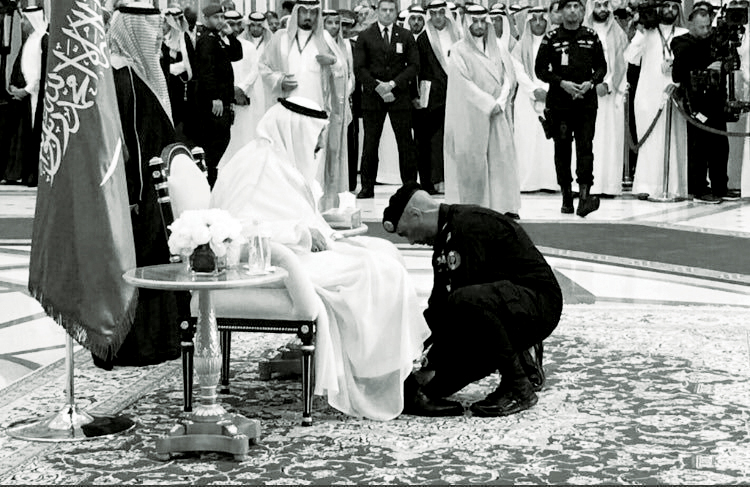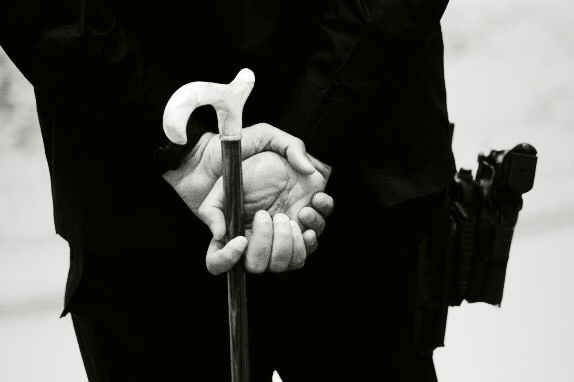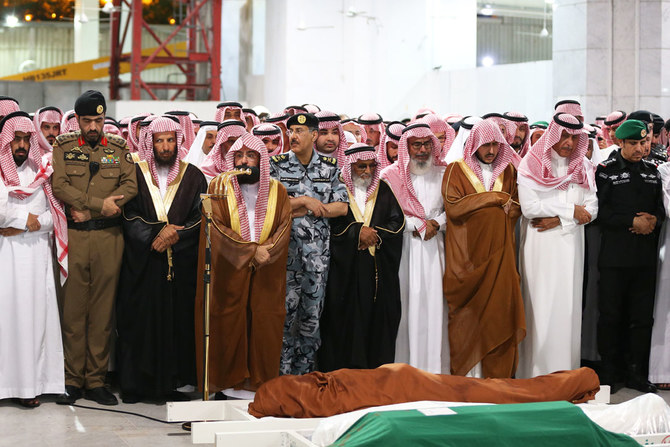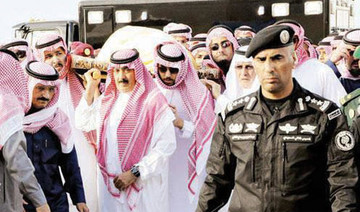JEDDAH: For nearly 15 years, he was the quiet hero — unobtrusive, almost always in the background, but keeping a watchful eye open for any hint of a threat to the safety of the monarchs whose lives he was pledged to protect.
As personal bodyguard to King Salman of Saudi Arabia, and before that in the entourage of the late King Abdullah, Maj. Gen. Abdulaziz Al-Fagham became a familiar figure at royal public appearances. His tall, slender body belied the muscular power that lay within; the calm, beardless face rarely if ever betrayed emotion, despite the importance of his role.
For many Saudis who grew to recognize his imposing presence from photos of royal events, he was the “guardian angel” who protected their king from harm. And on Sunday they woke up to the appalling news that he was dead.

Gen. Al-Fagham bowing to tie the King's shoelaces at a summit in Riyadh. (Supplied photo)
Gen. Al-Fagham died in hospital from gunshot wounds sustained in an altercation on Saturday night during what was described as “a personal dispute” at a friend’s home in Al-Shatee district of Jeddah.
“An acquaintance, Mamdouh bin Meshaal Al-Ali entered the residence,” police said.
“The conversation between Fagham and Ali escalated... Ali left the house, came back carrying a gun and fired at Fagham, injuring two others in the household — the house owner’s brother, Turki Al-Sabti, and a Filipino domestic worker.”
Ali refused to surrender to police who surrounded the house. He was killed in a shoot-out with officers, five of whom were wounded and are receiving treatment for their injuries. Gen. Al-Fagham was taken to hospital, but died as a result of his wounds.

Gen. Al-Fagham wore with pride the emblem of the Special Forces of the Royal Guard. (Supplied photo)
The funeral prayer was performed in the Holy Mosque in Makkah on Sunday after Isha prayer, attended by large crowds of people. The officer’s family will receive public condolences on Tuesday and Wednesday after 5pm at their home in Riyadh.
The murdered officer’s nephew, Naif Al-Fagham, said: “May God have mercy on my uncle … treacherously killed when he was at his friend’s house. He was an honored man to serve his country and his kings, and he is an honor to us all.”
The killer’s father, Dr. Mishaal Mamdouh Al-Ali, a member of the Saudi Shoura Council, offered his sincere condolences to the royal family, the royal guards, the Saudi nation, and Gen. Al-Fagham’s family and relatives. “May Allah have mercy upon the loyal, and son of loyals,” he said. He described the incident as a treacherous killing.
ALSO READ: Saudi king bodyguard killed in personal dispute: police statement
Serving the nation and its royal family was in Abdulaziz Al-Fagham’s blood. His father, Gen. Badah bin Abdullah Al-Fagham, worked for the late King Abdullah for 30 years before his son was appointed to the special brigade of the Saudi National Guard.
Abdulaziz enrolled at King Khaled Military College in 1989, and graduated in 1991. He was appointed to the Special Brigade before being transferred to the Royal Guard.
He also served as liaison officer for the official procession of King Abdullah and his guard and accompanied King Abdullah at formal events for 10 years. After the death of King Abdullah, Gen. Al-Fagham took a series of specialized courses that qualified him to protect the royal family, and was appointed bodyguard to King Salman.

Gen. Al-Fagham always carried the monarch’s cane at official events. (Supplied photo)
In that role he earned the respect and admiration of many Saudis, who claimed to detect a special bond between the monarch and his protector, with the bodyguard often appearing to act spontaneously when the king required assistance.
He bowed down to lace up King Salman’s shoes as the monarch received guests at the Arab Islamic-American Summit in Riyadh in 2017, an image widely shared on social media.
On another occasion, when the king visited Moscow, the special electronic staircase from the royal aircraft came to a sudden stop, and Gen. Al-Fagham immediately rushed to his assistance. Observers noted that his quick action showed his watchfulness, always on the alert to when he might be needed.
Gen. Al-Fagham was a well-known and popular figure among Saudis. “He spent his working life in the service of leadership with sincerity, honesty and dedication,” Minister of State for Foreign Affairs Adel Al-Jubeir said.


























